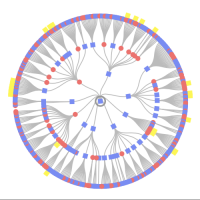Volunteer's Helping Hand
Answers
-
I respect that greatly. But still feel more room for read-only should be allowed. As you - I cannot claim to know that it is the one right way. So that makes me think there is room 'in the middle' for both.
For those leaning read-only: what harm is done by leaving a 'correct' profile open-edit?
For those leaning open-edit: what harm is done with a 'correct' profile being marked read-only?
Which harm would you pick over the other - especially for known, linked relations you have spent a lifetime (well maybe a good while) of study upon (or unneeded because you know who you are and your close relation to them) - and you do not wish to see morphed/destroyed - or not be able to recover from 'easily' - especially when such a change is wholly unnecessary and should not have proceeded? Why should such a close relation need to be watched closer than someone (obviously not close) can make an 'unwatchful'/careless mistake in a matter of minutes - and cause such angst, frustration, anxiety - throughout attempts to recover (hopefully successful)? How do you feel when such is the risk? Is your close relation and good data being valued appropriately? Or is bad data worth the risk? Why not impede such as much as possible - yes even to read-only for those near and dear? Shouldn't good/correct vital records -minimally be protected thusly?
You asked why am arguing - why am I still using FamilySearch? I have reasons to be loyal and to see FamilySearch succeed. I believe there should continue to be change to address Tree weaknesses.
Hopefully Ideas I have can help ...
Lunch is over ... back to work.
0 -
I don't see how locking more profiles would contribute to "success" of FamilySearch Family Tree. Also, locking comes at a very high cost in terms of management overhead.
Consider what has happened with English Wikipedia. That's a cautionary tale right there.
0 -
@dontiknowyou Well... I think I still need to focus on Ideas ASAP and see if any are helpful. Basically if a profile is 'sufficiently correct' there should be no harm in read-only - especially when a duplicate open-edit can be created. I don't see how that would be any worse than it is now ...? How would that not be successful?
But I have one idea that doesn't touch open-edit - and yes basically involves more collaboration...
Thank you for being civil with me - you can be on the Idea review team any day. I feel picked on by the 'vocal tag team' sometimes - while I feel there is a'silent majority'. Just imagine if the pendulum were on the read-only foot for a decade - then you might understand a bit more.
0 -
there should be no harm in read-only - especially when a duplicate open-edit can be created.
Well, that is the Ancestry.com model, isn't it, and the trees on Ancestry.com are a mess. Multiplying read-only profiles and duplicates would be antithetical to the foundation concept of Family Tree, which is that here we are building one tree.
you can be on the Idea review team any day.
No, I cannot. I am not eligible.
0 -
I guess I should be more enthusiastic about the 'opportunities' conflation messes cause.
0 -
I guess I should be more enthusiastic about the 'opportunities' conflation messes cause.
Yes, I totally agree. Some conflations have been around, causing conflicts in families, for decades.
1 -
A harmful bi-product in read-only records has been indicated as duplicate records popping up. But there is more. Yes, anyone who finds additional information not found in a read only record will be tempted to create a duplicate record. I, however, would not do that. I would assume the person who requested a record be locked down could be identified in the change log. I would message that person letting them know I have additional information and ask that he/she request the record be converted back to open edit. If the record never becomes open edit (a variety of reasons could cause that), then the additional information stays secret with me.
It doesn't really matter if I am dealing with a family member about an ancestor of mine, or someone not related to me about a non-ancestor of mine. If information can't be shared, how does it help the community? Of course, if it is a family record, my Ancestry account will contain a richer story of that ancestor than the FS record.
But, I have said multiple times, I do research on non-ancestors. I love having FamilySearch to share my findings. I can't really do that in Ancestry. So those additional sources will remain unshared.
0 -
I would assume the person who requested a record be locked down could be identified in the change log.
At present change logs of locked profiles do not identify "responsible" contributors. Example:
https://www.familysearch.org/tree/person/changelog/LZJW-C31
Notice the merged duplicates.
0 -
dontiknowyou Yes, you are right there is nothing in the change logs of locked profiles. My comment was theoretical, and in the context of changed rules whereby someone could request their family line or a specific ancestor be locked. If such a massive change was to take place (and I hope it never does), I am surmising that there would be a record of who requested the change to read-only status.
0 -
On Wikipedia pages can be locked and it doesn't matter who made the request. Why should it matter on Family Tree?
If someone (anyone) could simply request part of the tree be made read-only, then that would apply to everyone including the requester, wouldn't it?
It seems to me like a lot of bureaucracy for very little benefit.
Also, every argument along the lines of "Family Tree should be more like Ancestry or WikiTree" reminds me of New Coke. New Coke was meant to take market share away from Pepsi, a sweeter c o l a. But people who preferred Pepsi had no reason to switch to New Coke and people who didn't like Pepsi didn't like New Coke either. So New Coke was a very expensive failure.
Family Tree is like Coke: not everyone's favorite but those who like it really like it. Family Tree is for genealogists who want to work collaboratively on one tree with open editing.
1 -
Again, dontiknowyou I was responding to genthusiast's comment of no harm in read-only. I was trying to explain the harm, not advocate for the ability to request one's ancestors be made read-only.
0 -
@Gail Swihart Watson I understand. I am continuing to the conversation, not calling you out. Notice that I did not address you.
1

